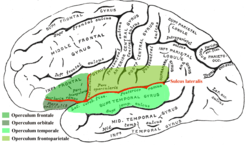Foix–Chavany–Marie syndrome

Editor-In-Chief: Prab R Tumpati, MD
Obesity, Sleep & Internal medicine
Founder, WikiMD Wellnesspedia &
W8MD medical weight loss NYC and sleep center NYC
| Foix–Chavany–Marie syndrome | |
|---|---|

| |
| Synonyms | Opercular syndrome, bilateral anterior opercular syndrome |
| Pronounce | N/A |
| Specialty | N/A |
| Symptoms | Facial diplegia, dysarthria, dysphagia, anarthria, automatic-voluntary dissociation |
| Complications | Aspiration pneumonia, malnutrition |
| Onset | Sudden or gradual, depending on cause |
| Duration | Variable, often chronic |
| Types | N/A |
| Causes | Stroke, trauma, infection, tumor |
| Risks | Hypertension, diabetes, smoking, hyperlipidemia |
| Diagnosis | Clinical examination, MRI, CT scan |
| Differential diagnosis | Locked-in syndrome, pseudobulbar palsy, Moebius syndrome |
| Prevention | N/A |
| Treatment | Speech therapy, physical therapy, occupational therapy, nutritional support |
| Medication | N/A |
| Prognosis | Variable, depends on underlying cause and treatment |
| Frequency | Rare |
| Deaths | N/A |
Foix–Chavany–Marie syndrome (FCMS), also known as bilateral anterior opercular syndrome, is a rare neurological disorder characterized by the loss of voluntary control over the muscles of the face, tongue, pharynx, and masticatory muscles, while involuntary and reflexive movements remain intact. This condition is named after the French neurologists Charles Foix, Jean Alfred √âmile Chavany, and Julien Marie, who first described it in 1926.
Clinical Features[edit]
Patients with Foix–Chavany–Marie syndrome typically present with:
- Dysarthria: Difficulty in articulating words due to muscle weakness.
- Dysphagia: Difficulty in swallowing.
- Facial diplegia: Paralysis of the facial muscles on both sides.
- Preservation of reflexive movements such as blinking and emotional expressions.
Pathophysiology[edit]
The syndrome results from bilateral lesions in the anterior operculum, which is part of the cerebral cortex involved in motor control of the face and mouth. These lesions can be caused by various factors, including:
Diagnosis[edit]
Diagnosis of FCMS is primarily clinical, supported by imaging studies such as magnetic resonance imaging (MRI) or computed tomography (CT) scans that reveal bilateral lesions in the anterior operculum. Electromyography (EMG) and nerve conduction studies may also be used to assess the extent of muscle involvement.
Treatment[edit]
There is no specific treatment for Foix–Chavany–Marie syndrome. Management focuses on addressing the underlying cause and providing supportive care, which may include:
- Speech therapy
- Physical therapy
- Nutritional support to manage dysphagia
- Medications to control symptoms such as muscle spasticity
Prognosis[edit]
The prognosis of FCMS varies depending on the underlying cause and the extent of the brain lesions. Some patients may experience partial recovery of function, while others may have persistent deficits.
See also[edit]
- Stroke
- Dysarthria
- Dysphagia
- Cerebral cortex
- Traumatic brain injury
- Encephalitis
- Neurodegenerative diseases
References[edit]
<references group="" responsive="1"></references>
External Links[edit]
Ad. Transform your life with W8MD's Budget GLP-1 injections from $75


W8MD offers a medical weight loss program to lose weight in Philadelphia. Our physician-supervised medical weight loss provides:
- Weight loss injections in NYC (generic and brand names):
- Zepbound / Mounjaro, Wegovy / Ozempic, Saxenda
- Most insurances accepted or discounted self-pay rates. We will obtain insurance prior authorizations if needed.
- Generic GLP1 weight loss injections from $75 for the starting dose.
- Also offer prescription weight loss medications including Phentermine, Qsymia, Diethylpropion, Contrave etc.
NYC weight loss doctor appointmentsNYC weight loss doctor appointments
Start your NYC weight loss journey today at our NYC medical weight loss and Philadelphia medical weight loss clinics.
- Call 718-946-5500 to lose weight in NYC or for medical weight loss in Philadelphia 215-676-2334.
- Tags:NYC medical weight loss, Philadelphia lose weight Zepbound NYC, Budget GLP1 weight loss injections, Wegovy Philadelphia, Wegovy NYC, Philadelphia medical weight loss, Brookly weight loss and Wegovy NYC
|
WikiMD's Wellness Encyclopedia |
| Let Food Be Thy Medicine Medicine Thy Food - Hippocrates |
Medical Disclaimer: WikiMD is not a substitute for professional medical advice. The information on WikiMD is provided as an information resource only, may be incorrect, outdated or misleading, and is not to be used or relied on for any diagnostic or treatment purposes. Please consult your health care provider before making any healthcare decisions or for guidance about a specific medical condition. WikiMD expressly disclaims responsibility, and shall have no liability, for any damages, loss, injury, or liability whatsoever suffered as a result of your reliance on the information contained in this site. By visiting this site you agree to the foregoing terms and conditions, which may from time to time be changed or supplemented by WikiMD. If you do not agree to the foregoing terms and conditions, you should not enter or use this site. See full disclaimer.
Credits:Most images are courtesy of Wikimedia commons, and templates, categories Wikipedia, licensed under CC BY SA or similar.
Translate this page: - East Asian
中文,
日本,
한국어,
South Asian
हिन्दी,
தமிழ்,
తెలుగు,
Urdu,
ಕನ್ನಡ,
Southeast Asian
Indonesian,
Vietnamese,
Thai,
မြန်မာဘာသာ,
বাংলা
European
español,
Deutsch,
français,
Greek,
português do Brasil,
polski,
română,
русский,
Nederlands,
norsk,
svenska,
suomi,
Italian
Middle Eastern & African
عربى,
Turkish,
Persian,
Hebrew,
Afrikaans,
isiZulu,
Kiswahili,
Other
Bulgarian,
Hungarian,
Czech,
Swedish,
മലയാളം,
मराठी,
ਪੰਜਾਬੀ,
ગુજરાતી,
Portuguese,
Ukrainian
